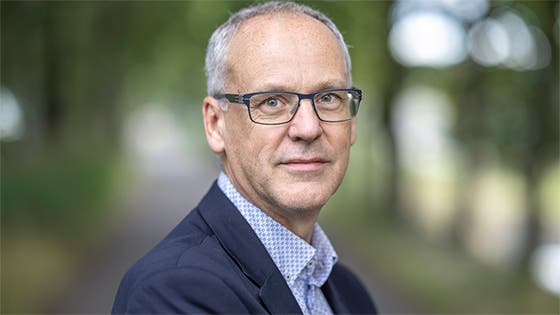'Doctors, teach children how to participate'

"Ask a child about what he is doing, what he likes and what he wants to achieve. The input of young people and their parents is crucial," UMC Utrecht Professor of Paediatric Rehabilitation Medicine Jan Willem Gorter argued in his oration on 8 November. He urged colleagues not to think in limitations but in possibilities. "We doctors can help increase children's autonomy and ease the transition to adulthood," he said.
In the speech, Jan Willem Gorter called for doctors to become more knowledgeable about how children and young people with developmental disabilities can participate optimally in society.
"You always have to make a link between the problem and daily practice. Of course, here in the hospital we work with a treatment plan. But then the child goes home, to school and starts participating in society and that's where it all must happen. The daily lives of children and young people with disabilities are affected by developments in medicine.
However, the health of this group is mainly determined by (genetic) predisposition, socio-economic status and human behaviour. As with all children and adolescents."
Life care
Jan Willem Gorter and his team provide life-course care from the Rehabilitation, Physiotherapy Science and Sport (RF&S) department at the Wilhelmina Children's Hospital and Princess Máxima Centre sites, working closely with the Brain and Child Health, Dynamics of Youth (Utrecht University) and Utrecht University of Applied Sciences spearheads. When children are born with a condition or experience an illness or accident at a young age, it can lead to visible limitations in their development. For example, someone needs a wheelchair to get around, or a speech computer for communication. There are also invisible consequences, especially when it comes to learning skills, mental toughness, and social-emotional well-being.
"A characteristic of developing children is that interactions with the environment are constantly changing. This is especially true during transitions in care, for example from hospital to home, or from the toddler group in a rehabilitation centre to primary education, or from childcare to adult care," explains Jan Willem Gorter. "This process is not linear. While the medical diagnosis, for example brain disease, muscle disease, oncological disease and skeletal disposition disorder is stable, the rehabilitation diagnosis may change from less to more limitations in daily life. Simply because different demands are placed on the child in the new environment. So, the question of what the meaning of the medical diagnosis is on the child's and family's functioning presents new challenges, insights and answers every time."
Opportunity inequality
The Netherlands has 1.3 million young people between 0 and 25 years with a chronic condition. Compared to their peers, they have, on average, poorer prospects. As young adults, they struggle with their health more often. They have more difficulty finding and keeping a job, living independently, and finding a partner. The impact of disability is amplified if children or young people also belong to a minority group, for example because of their orientation or migration background.
So how can doctors help increase children's autonomy and ease the transition to adulthood? "By setting goals with their patients that are meaningful to them and their parents. The ultimate success of treatment is partly determined by the interaction between person and environment. "So, we need to look for ways to facilitate this: technology and tools, but also adjustments that match the demands that the environment and society place on children ", argues Jan Willem Gorter.
In discussing this, the team uses six keywords, also known as the six favourite words: family, functioning, fitness, fun, friends, and future. "These are simple words that can be a springboard for looking at possibilities, at what can be done, and looking together with those involved for an approach to create opportunities." In addition, asking "How are you doing?" is important for both children and other family members. Research shows that this works best when doctors come to such an approach together with children and young people and their parents, and that is what Jan Willem Gorter advocates.
Opportunities
"I see it as my job to take paediatric rehabilitation medicine forward. I want to be close to medical and technological developments, i.e., at the university hospital and anticipate new developments. It is also my job to share knowledge through healthcare networks throughout the Netherlands." The lights in the Professor of Pediatric Rehabilitation Medicine's eyes speak volumes: "The focus should be on activities and participation, thinking in terms of possibilities and connecting to what is important for the child and family."
